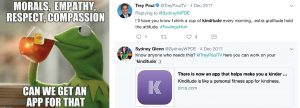I’m a good person…seriously…just check my Kinditude!
My phone noisily vibrates on the empty train seat beside me, snapping me out of my daydream. A notification on my locked screen says “Remind to be kind!”. The grammar needs work, but the message is clear: I need to do something kind before midnight. As we arrive at our destination I smile at the woman sitting right across me and say “Fijne dag”. She smiles and I walk away knowing I have something to log into my Kinditude app.
The term, “the quantified self” was coined by Wired editors Gary Wolf and Kevin Kelly in 2007 to describe the use of digital self-tracking technologies that measured our bodies and daily activities (Lupton). Wolf described these technologies as “useful when we reflect, learn, remember and want to improve” (Wolf, 2010). Technologies that promise to optimise and fine-tune our lives range from apps to wearable devices that track and quantify steps taken, distances walked, calories lost, our heart rates, sleep patterns, menstrual cycles…and as of November 2017, even kind deeds.

Source: www.me.me/i/morals-empathy-respect-compassion-can-we-get-an-app-for-14272899; twitter
The Kinditude app was launched with the idea that “kindness is more than a random act. It is an attitude that needs to be instilled, a habit that needs to be developed” (Kinditude) and is the latest in an emerging trend of apps aimed to teach or encourage empathy that are gaining popularity in classrooms (G, Ana) and workplaces (Lindsey).
How data is generated:

Source: itunes.apple.com/us/app/kinditude-kindness-journal
The app is modelled on the format of a journal and each day it nudges you by means of a reminder to input your kind deeds under the following predetermined categories: “Expression” (thoughts, words or actions), “Scenario” (spontaneous or planned), “Mode” (money, time or effort), “Towards” (people, environment, animals, self) and “Impact” (None, Low, Medium, High). Almost immediately, a smile you gave a stranger, a caring thought or the trash you recycled, are all automatically analysed and presented back to you in various graphs aiming to tell you on which days you are most charitable, how you express your kindness and the impact of your selflessness (as well as which areas leave room for improvement). If you’re trying to continue your philanthropic streak, but feel stuck for inspiration, the app also provides tips such as “plant a tree” or “donate to a charity” and in addition, you’re able to share your journal to inspire others. (Kinditude App).
Is this infrastructure effective?
While these categories are certainly questionable, as they attempt to fit qualitative data into neat quantitative categories, it raises questions of how one is able to accurately measure the impact of a kind thought, for example. And if it is possible to do so, what is the criteria for qualifying as low, medium or high impact and is the impact always instantly perceivable? And is it enough to have kind thoughts without any physical manifestation of these thoughts? In his book, The Data Revolution. Big Data, Open Data, Infrastructures and their Consequences, Rob Kitchin explicates how a significant loss of richness and abstraction occurs when qualitative data is made to conform to quantitative classification (Kitchin 5).
The Paradox
Richard Thaler and Cass Sunstein, authors of the 2008 book Improving Decisions about Health, Wealth and Happiness, coined the term “nudges” to describe a set of interventions that aim to attract our attention and influence our behavior to effect a desired outcome, while still maintaining the idea of free choice. Their optimism is evident when they outline the positive ways they believe nudges could influence social and political life. They called this movement “Libertarian Paternalism”, describing a non-intrusive type of paternalism because choices are not blocked, fenced off, or significantly burdened. (Thaler et al. 5) In this way, Kinditude aims to nudge people, by means of daily reminders and suggestions, to do something kind. And if the outcome is pleasing, why worry?
In a keynote address delivered at the Inaugural Media Ecology Association Convention in 2000, Neil Postman makes the case for humane progress. He contends that the fundamental principle of media ecology is that “it gives form to a culture’s politics, social organization, and habitual ways of thinking” and that he quite frankly, does not see any use in studying the media unless one takes into account the moral and ethical context. He goes further to pose the question: “To what extent do new media enhance or diminish our moral sense, our capacity for goodness?” (Postman 15)
However well-meaning the Kinditude app may be, what does it say about our society that suggestions of how to be kind and daily reminders are deemed necessary for people to show kindness? And what are the long term consequences of relying on technology for quick fixes? Evgeny Morozov, in his book To Save Everything Click Here, asserts that although self-tracking and ‘gamification’ (the practice of introducing ‘game mechanics’, points, rewards into social practices to encourage a preferred outcome) might add an element of fun to what might be an otherwise arduous task, the problem is that they can make our lives less meaningful and less consistent with the quirks of the human condition (233). He adds “if citizens engage in the ‘desired behavior’ because it’s more fun, then their actions have nothing to do with duty,” since there is no evidence that if the incentive (the reward of a ‘streak’ etc.) is taken away, that people would continue engaging in desired behaviour. (206)
Solutionists believe that given the right algorithms, technology is able to solve all of humankind’s problems, which is a view that Morozov believes harbours hidden danger. He warns: “In promising almost immediate and much cheaper results, they can easily undermine support for more ambitious, more intellectually stimulating, but also more demanding reform projects” (Morozov 18). In the case of Kinditude, quick fixes like this app do not directly address larger issues in our society that might need redress. It, instead, places a band-aid on a proverbial wound that might, in fact, need surgery.
Conclusion
While it is well known that acts of charity, altruism, and philanthropy result in psychological benefits for the giver, it is also backed by research that we likely benefit more when our motivations for kindness are other-oriented as opposed to self-oriented (Gruman). Technologies that aim to fix human problems and “Remind to be kind!”, might be well intentioned, but fall short if they compromise authenticity, human connectedness and fail to accurately diagnose the problem. Gary Wolf, ironically, said “We make our tools, but as we make them, they make us”. (Wolf, 2011)
Bibliography
Lupton, Deborah. “Self-tracking, health and medicine”. Health Sociology Review, Taylor and Francis Group, 2017, 26:1, 1-5, DOI: 10.1080/14461242.2016.1228149
Wolf, Gary. “The Quantified Self”. TED Talks. 2010 www.ted.com/talks/gary_wolf_the_quantified_self/transcript#t-37266
Kinditude www.kinditude.com
G, Ana. “10 Apps that Promote Empathy and Compassion”. Froddo, 2016. www.froddo.com/10-apps-that-promote-empathy-and-compassion
Lindsey, Jaclyn. “Why Kindness Is The Answer To Workplace Woes”. Forbes, 2017. www.forbes.com/sites/break-the-future/2017/11/28/why-kindness-is-the-answer-to-workplace-woes/#418e9326bb0e
Kinditude App. “Kinditude App Preview Video”. 2017. www.youtube.com/watch?v=BywfuAqa_lw
Kitchin, Rob. The Data Revolution: Big Data, Open Data, Data Infrastructures & Their Consequences. Sage Publications, 2014.
Thaler, Richard H. and Sunstein, Cass R. Nudge: Improving Decisions About Health, Wealth, and Happiness. Yale University Press, 2008.
Postman, Neil. The Humanism of Media Ecology. Proceedings of the Media Ecology Association, vol. 1, 2000.
Morozov, Evgeny. To Save Everything, Click Here: The Folly of Technological Solutionism. Public Affairs, 2013. (chapter “Solutionism and Its Discontents”)
Gruman, Jamie. “Being Kind to Others Benefits You”. Psychology Today, 2018. www.psychologytoday.com/us/blog/dont-forget-the-basil/201806/being-kind-others-benefits-you
Wolf, Gary. “TEDxAmsterdam 2011”, 2011. www.youtube.com/watch?v=YN_MjyNq3Z8